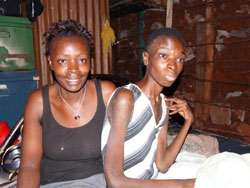Kenya - Simple Actions Keep Patients and their Families Healthier
Maureen Awour, 37, is a single mother living with HIV in Kibera, a sprawling low-income settlement in Kenya’s capital Nairobi. Her health declined drastically late last year when she contracted meningitis and was hospitalized for several weeks. She is now recovering at home, but she is now bedridden and cared for by her sister Lynne Awour.
The illness took a big toll on Maureen, weakening her bones and affecting her mental stability. With her condition, she was advised to follow a strict diet and maintain proper hygiene to recover. A long bout of diarrhea has left her malnourished and weak. She is too weak to use the toilet. She uses diapers. 
Lynne says that although the diapers are convenient because they save her from washing bedding, handling them with bare hands is risky. She cannot afford to use rubber gloves.
Lynne’s fears were confirmed when Rosemary Anyango, a community health worker, told her that using bare hands to handle the diapers could give her and the patient infections. Luckily, the volunteer also had a solution. She advised Lynne to use readily available plastic wrapper bags in place of gloves.
“When we change her diapers, we have to ensure that our hands are clean. After changing them we also have to wash our hands to avoid contamination,” says Lynne. “We also ensure that we dispose of the diapers and plastic wrapping safely [in a pit latrine],” she says.
Rosemary learned of Maureen’s condition while mapping homes of HIV patients in the slum. The exercise helped identify patients that she and other community volunteers could care for following their WASHplus training program on water, sanitation, and hygiene promotion for people living with HIV.
When she visited Maureen’s home, Rosemary talked to the family about maintaining good sanitation. She taught them how to take better care of Maureen as she needed special attention because HIV had reduced her body’s protection against diseases. Applying what she learned from WASHplus training about small doable actions to help make simple changes to improve Maureen’s care, Rosemary helped the family make a commode from a plastic chair and a bucket with a lid for Maureen.
These days, Maureen uses fewer diapers because she can use the commode next to her bed to relieve herself, saving her family much-needed resources. “I don’t strain my knees or hurt myself sitting on the chair, unlike the bucket, which was very uncomfortable,” says Maureen.

